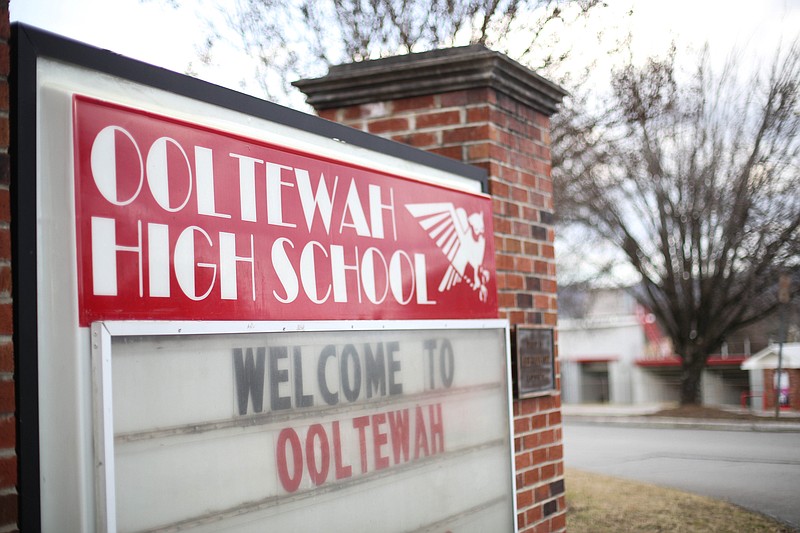The Hamilton County Board of Education should not be held liable for the rape of an Ooltewah High School freshman, according to a response filed in federal court this week.
The victim's family filed the lawsuit against the school board and three former Ooltewah High School employees in September, alleging a long and violent history of hazing and sexual abuse of male student athletes. The lawsuit accuses district and school administrators and staff of knowing abuse was taking place and failing to protect students.
But in the board's 22-page response, attorney Charles Purcell argues the board acted "in good faith without deliberate indifference to Plaintiffs' constitutional rights."
The plaintiff is a former Ooltewah High School freshman who was raped by his basketball teammates with a pool cue during a team trip to Gatlinburg, Tenn., just days before Christmas. The victim, 15 at the time of the attack, suffered injuries so severe he was rushed to a hospital for emergency surgery.
The victim and his mother filed the lawsuit against the Hamilton County Board of Education, former Ooltewah High School Principal Jim Jarvis, the school's former Athletic Director Allard "Jesse" Nayadley and former head basketball coach Andre "Tank" Montgomery.
In the lawsuit, the plaintiff asks that a jury decide the amount of damages the victim is entitled to receive from each defendant.
The response filed by Purcell represents only the board, and court records show Jarvis, Nayadley and Montgomery are being represented by Arthur Knight, an attorney from Knoxville. The separate representation and response could signal that both the board and the individuals named in the lawsuit will attempt to shift responsibility to the other in future court proceedings.
Montgomery and Nayadley were in Gatlinburg at the time of the attack, and Jarvis was an administrator at the school during many of the allegations of abuse cited in the lawsuit. It's expected a response will be filed on their behalf in coming weeks.
The board shouldn't be held responsible for the alleged injuries the victim received from three older teammates, according to the response, which states those teammates are the "sole and proximate cause of the alleged injuries sustained by the Plaintiffs."
Three former Ooltewah High School students have been convicted in connection with the pool cue rape of the Plaintiff. The oldest of the perpetrators, who turned 18 soon after the attack, was convicted of aggravated rape and aggravated assault in Sevier County Juvenile Court and will be released from juvenile detention in the coming weeks. The two other players, 16 at the time of the attack, were convicted of aggravated assault and will also be released soon.
If anyone should have been aware the three boys were going to commit the attack, it would have been their parents, not the school board, the response argues.
"The Plaintiffs have no legally cognizable action against [the school board] for negligent supervision," the response continues.
The lawsuit against the board claims it failed to maintain adequate policies and training regarding student hazing and bullying. The board also did not adequately train employees about mandatory reporting of abuse, which according to the lawsuit created a climate where such misconduct was tolerated and encouraged due to a lack of consequence.
The lawsuit claims the board's failure to have the proper policies and training in place means it should not be protected by the state's Governmental Tort Liability Act, which protects governmental boards from lawsuits and limits the amount of damages that can be paid. Attorneys say the board failed to protect the victim, and that Jarvis, Nayadley and Montgomery's negligent actions provide legal grounds to remove the board's immunity.
The board's response says it should be covered under tort law, as its members acted in the "scope of their employment."
"Therefore, the Plaintiffs may not recover from this Defendant," the response continues.
If the court determines the board is liable and must pay damages, it warns in the response that it will attempt to have the sum reduced under Tennessee's "modified comparative fault" law. This law allows the court to award damages based on the level of fault of each party involved in the case, meaning the board may attempt to shift a large percentage of the damages onto the individuals named in the lawsuit.
Also in the response, Purcell denies the plaintiffs' complaints and allegations, and cites a lack of evidence.
Responding paragraph by paragraph to the lawsuit, Purcell repeats many times the phrase: "Denied on the grounds that this Defendant is without sufficient information or knowledge to either admit or deny the allegations and strict proof of same is hereby demanded."
The attorneys representing the plaintiff are Douglas Fierberg and Monica Beck of the Fierberg National Law Group based in Washington, D.C., and Eddie Schmidt of Nashville.
Purcell is based in Jackson, Tenn., and works at Purcell, Sellers & Craig Inc.
Contact staff writer Kendi A. Rainwater at 423-757-6592 or krainwater@timesfreepress.com. Follow on Twitter @kendi_and.
